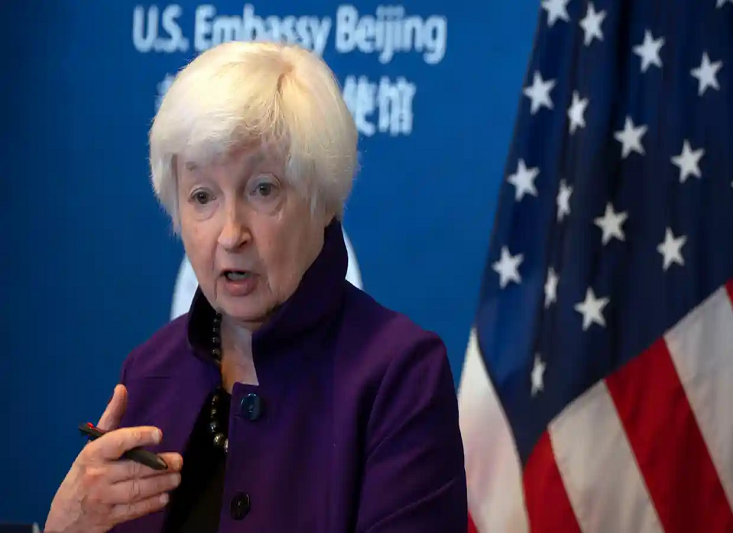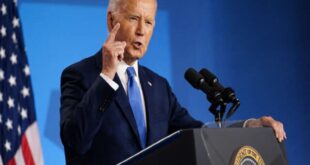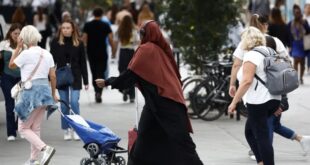
When Janet Yellen left Beijing on Sunday after four days of talks, the US treasury secretary in effect admitted that the delegation achieved its main objective simply by sitting down with top Chinese officials.
After years of dangerous and deepening separation between the people running the world’s two biggest economies, they were finally back in a room together.
At a brief press conference that was the only tangible outcome of the talks, Yellen listed her hopes for the future. They included something that a decade ago would have been taken for granted: regular “senior-level diplomacy” between Washington and Beijing to manage their relationship.
Now the US can be more confident of that, and the relief is tangible. The meetings between Yellen and Chinese financial officials were particularly urgent, given there is a changing of the guard under way in Beijing.
Personal relationships between the US political elite and outgoing Chinese decision makers that dated back to before the pandemic are being rendered obsolete.
Yellen’s visit is part of a broader push to put ties back on what she called a “surer footing”. She was following in the footsteps of the secretary of state, Antony Blinken, who last month led the first senior US delegation to China in more than three years.
After years of deepening economic and military mistrust between the superpowers, they were finally back in a room together
Better communication is vital because it reduces the risk of misunderstandings or disputes between two nuclear-armed superpowers spiralling towards unintended hostilities – whether economic or military.
But if the effort to rebuild these relationships is bearing fruit, it also throws a far greater challenge into relief. Now the two sides are talking, will their diplomacy aim only to stave off crisis, or can they use it to make constructive progress in a difficult relationship?
Yellen highlighted areas where collaboration is desperately needed, and should not threaten the core strategic interests of either side, from financing investments to tackle the global climate crisis, to dealing with the heavy debts of some of the world’s poorest countries.
But the milestones of this trip may be challenging to build on. The Covid-19 pandemic cut off in-person meetings, and accelerated a shift in the relationship between China and the west, perhaps best captured in a term coined by the EU. In 2019 it officially designed Beijing a “systemic rival”, even though China remains one of its top trade partners.
The consensus of the previous decades, that economic engagement with China would bind the country into the post-second world war world order and that economic liberalisation could catalyse political liberalisation, has been firmly put aside.
Replacing it is an uneasy mix of mutual dependency and mistrust. China has accused the west of trying to choke off its economic growth to prevent its rise as a global power. In March, Xi Jinping accused the west, led by the US, of “all-round containment, encirclement and suppression”.
Many policymakers in the west fear China will use western-developed technology to build a military more powerful than the US’s. That prompted the US to bar the sale of the most advanced microchips to China last year.
Looming over disputes about trade, AI, Beijing’s close ties with Russia as it wages war in Ukraine, China’s human rights record and other controversial issues, is the remote but real risk the countries could end up in a war precipitated by a Chinese military campaign to capture Taiwan.
Xi has told China’s armed forces to be ready to do this by 2027, US intelligence believes. Military ships and planes were sent into waters and airspace near Taiwan during Yellen’s visit, keeping up pressure on something Beijing sees as a core issue.
There is a greater and more immediately urgent risk, that sanctions and other tensions could escalate towards an economic war. Beijing has accused the US of seeking to “de-couple”, or try to separate their countries’ closely entwined economies.
That would be catastrophic for both, something Yellen acknowledged on Sunday morning, saying US moves to protect national security would be narrow and carefully targeted. She described decoupling – attempting to separate the two countries’ economies – as “virtually impossible”.
If it were attempted, it would be “disastrous for both countries and destabilising for the world”; US policymakers now prefer to talk about “de-risking” their relationship.
This fear of mutually assured economic destruction is one reason to hope that both countries will try to build on this diplomatic thaw, even as they manage mistrust and security tensions that are here for the long term.
But it was perhaps a sign of how bad things have got between the US and China that one of the most senior visits to Beijing in years had the most modest of aims: better communication. The question now is where the relationship goes next.
By Emma Graham-Harrison in Taipei – The Guardian




 World Opinions Débats De Société, Questions, Opinions et Tribunes.. La Voix Des Sans-Voix | Alternative Média
World Opinions Débats De Société, Questions, Opinions et Tribunes.. La Voix Des Sans-Voix | Alternative Média




